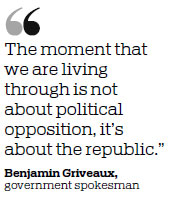Paris yields to pressure on fuel price hikes
PARIS - The French government, under pressure from weeks of "yellow vest" protests over rising living costs, has scrapped all planned fuel tax hikes for 2019 and appealed for calm.
An increase scheduled for Jan 1 was "scrapped for the year 2019" in its entirety, Environment Minister Francois de Rugy announced on BFM TV, in an about-turn for the government.
The presidency, meanwhile, warned of possible violence during a new round of protests planned for Saturday in Paris and elsewhere in the country.
"We have reasons to fear major violence," a source in the Elysee Palace said amid calls for fresh mobilization of the "yellow vests" movement already linked to four deaths and hundreds of injuries in often violent demonstrations.
The protests began on Nov 17 to oppose rising fuel taxes, but have ballooned into a broad challenge to French President Emmanuel Macron's perceived pro-business agenda and complaints that he is out of touch with the struggles of ordinary people.

Demonstrators have blocked roads nationwide, playing havoc with traffic in the busy run-up to Christmas.
On Saturday, rioters ran amok in the capital, torching nearly 200 cars, smashing shop windows, and vandalizing the Arc de Triomphe.
Macron and his government appealed for calm on Wednesday, and signaled they were ready to make further concessions to avoid more violence. "The moment that we are living through is not about political opposition, it's about the republic," government spokesman Benjamin Griveaux said after a meeting where he said Macron urged decision-makers to issue "a clear and explicit call to calm".
However, far-right leader Marine Le Pen and hard-left firebrand Jean-Luc Melenchon have been vocal in backing the demonstrators' demands.
Tax cuts for the rich
Protests continued on Wednesday, with petrol depots, service stations, and shopping centers among the targets of the "yellow vests" - so named for the high-visibility road safety jackets they wear.
Macron, whose approval ratings are down to just 23 percent, is yet to comment publicly since returning to France from a G20 summit in Argentina on Sunday.
But his office said he told ministers he would stick to his decision to cut a "fortune tax" on high-earners - a move which has infuriated many protesters.
Macron had made cutting wealth taxes a key campaign pledge ahead of his election in May 2017, arguing such levies discourage investment and drive away entrepreneurs.
But the policy, along with comments deemed insensitive to the working class, has prompted many of the ex-banker's critics to label him a "president of the rich".
Some experts say the government may have reacted too late to the protests - a regular feature of French political life which have repeatedly forced previous presidents into U-turns. "When you leave things to fester too long, it costs more," said Jean-Francois Amadieu, a sociologist.
Afp - Reuters
(China Daily 12/07/2018 page11)














